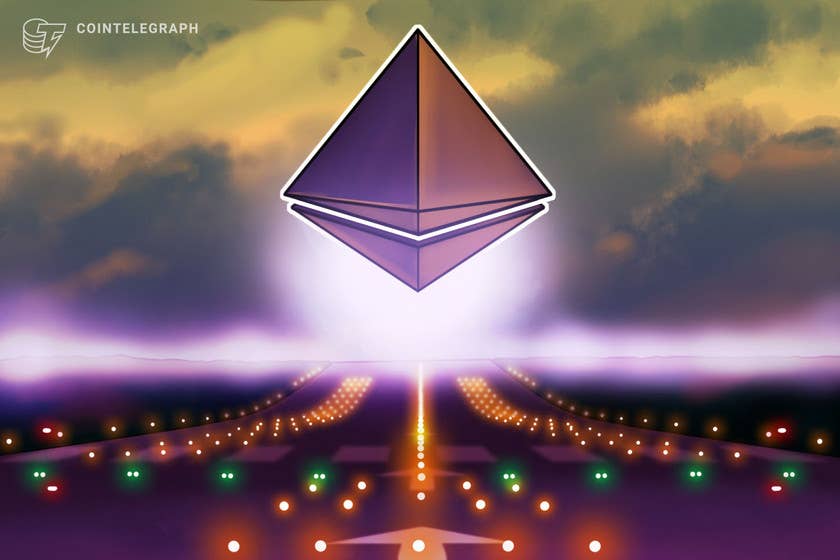Ethereum eyes $6.5K bullish target as ETH price chart paints ‘Cup and Handle’

The success rate for cup and handle patterns in forex and stock markets, on daily timeframes, are 65% and 68%, respectively, per a Harvard study.
Ethereum blockchain’s native asset Ether (ETH) faces the prospect of exploding towards $6,500 in the coming sessions.
ETH looks like a cup and handle too. Thoughts?
— Raoul Pal (@RaoulGMI) September 15, 2021
The bullish analogy takes cues from a textbook technical pattern dubbed “Cup and Handle.” In detail, a Cup and Handle structure develops after the price first rallies significantly to the upside and then corrects to carve out a rounding bottom, called the “cup.”
The move follows a rebound towards the prior high and a failed breakout attempt above the said level. As a result, the price pulls back once again and grinds out a smaller rounding bottom, called the “handle.”
Ultimately, the price returns to prior high for the second time and breaks out successfully, resulting in a move equal to the cup’s depth.
So it seems the ETH/USD exchange rate has painted a cup and is now forming a handle, as shown in the chart below.

The depth of the ETH/USD’s cup is nearly $2,437. As a result, should the pair retest $4,112-resistance for a bullish breakout move, its prospect of rising by as much as $2,437 will increase. In doing so, Ether would eye a run-up towards $6,549.
A Harvard study shows that cup and handle patterns have a 65% and 68% success rate in forex and stock markets, respectively, on daily timeframe charts.
Institutional FOMO on
Ethereum’s upside analogy appears against the backdrop of growing institutional interest.
In a report published on Sept. 7, Standard Chartered, a multinational banking giant headquartered in London, discussed Ether’s economic use-case, adding that the cost to purchase one ETH could grow to $26,000-$35,000 in the future.
“The current transition to ETH 2.0 could transform ETH by increasing its functionality and scalability and reducing environmental concerns, although it could raise more complex security issues,” the report stated.
“Timelines for ETH 2.0 rollout could slip, but in the near term, decreasing net supply — as ETH is staked for ETH 2.0 — should provide price cushion.”
In an interview with CNBC, Cathie Wood, CEO of Ark Invest, that her firm would split its crypto investments into 60% Bitcoin and 40% Ethereum. The former AllianceBernstein executive envisioned a higher demand for ETH tokens in the wake of ongoing growth in Ethereum-backed decentralized finance (DeFi) and nonfungible token (NFT) craze.
“I’m fascinated with what’s going on in DeFi, which is collapsing the cost of the infrastructure for financial services in a way that I know that the traditional financial industry does not appreciate right now,” Wood told CNBC anchor Andrew Ross Sorkin at the Salt technology conference in New York.
“Our confidence in ethereum has gone up dramatically as we’ve seen the beginning of this transition from proof-of-work to proof-of-stake.”
Rivalry risks
Meanwhile, Ethereum also faced criticism for its inability to resolve higher transaction fees and network congestion issues. That prompted emerging layer one blockchain rivals like Solana (SOL), Avalanche (AVAX), and Cardano (ADA) to eat up a portion of Ethereum’s market hegemony.
It would take Ethereum another two years to become a fully functional proof-of-stake protocol, per its official roadmap. The transition consists of a three-step process. In the first, Ethereum has implemented the Beacon chain to introduce staking on a separate layer.
Related: Cointelegraph Research: Is Solana an ‘Ethereum killer?
The next step scheduled sometime later in 2021 will see Ethereum’s original chain merger with the Beacon chain. Meanwhile, Ethereum will introduce “shard chains” that expect to enable Ethereum to process more transactions in the final phase.
The views and opinions expressed here are solely those of the author and do not necessarily reflect the views of Cointelegraph.com. Every investment and trading move involves risk, you should conduct your own research when making a decision.




